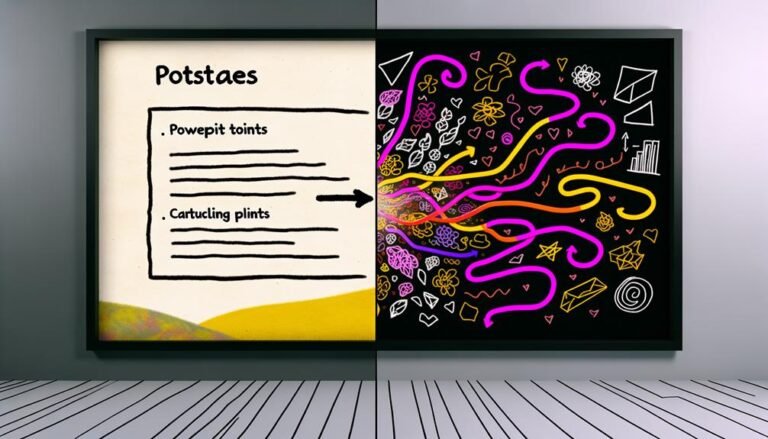Mastering Effective E-Learning: Key Foundations Unveiled
Exploring the intricacies of effective e-learning entails dissecting the core pillars that uphold successful online educational endeavors.
From foundational principles to engagement strategies and the nuanced dynamics of assessment and feedback mechanisms, each element plays a vital role in shaping the digital learning landscape.
By unraveling these critical foundations, a clearer path towards optimizing e-learning initiatives emerges.
It is within this framework that educators and instructional designers can harness the power of technology to foster enriched learning experiences.
Key Takeaways
- Clear learning objectives and performance goals are essential for effective e-learning.
- Engagement strategies like interactive elements and varied teaching approaches enhance learner participation.
- Assessment diversity and feedback reinforcement drive improved learning outcomes.
- Rewards, recognition, and continuous support fuel motivation and sustained knowledge acquisition.
Foundational Elements for Effective E-Learning
The foundational elements underpinning effective e-learning serve as the cornerstone for designing impactful online courses that resonate with learners' needs and drive meaningful learning outcomes. Learner motivation is a key aspect that influences the success of online courses. Understanding what motivates learners to engage with the material and complete the course is essential for course designers.
Setting clear performance goals provides direction and purpose for both learners and instructors. By aligning course objectives with performance goals, learners are more likely to stay focused, motivated, and committed to achieving desired outcomes. Incorporating these foundational elements ensures that e-learning courses are purposeful, engaging, and effective in meeting the diverse needs of learners.
Strategies for Engaging E-Learners
Strategies for engaging e-learners encompass a range of interactive and innovative approaches to enhance learning experiences. Interactive activities play a vital role in capturing and maintaining learner engagement throughout the course. Some effective strategies include:
- Gamification: Incorporating game-like elements such as quizzes, challenges, and leaderboards can make learning more interactive and enjoyable.
- Virtual Labs: Providing hands-on experiences through virtual labs enables learners to apply theoretical knowledge in practical scenarios, increasing engagement and understanding.
- Peer Collaboration: Encouraging collaboration through discussion forums, group projects, or peer reviews promotes active participation and a sense of community among learners, fostering engagement and deeper learning.
Assessment and Feedback Best Practices
Enhancing e-learning effectiveness through well-structured assessment and feedback practices is paramount for fostering continuous learning and improvement among learners.
Formative assessment, a key component, allows for ongoing evaluation of student understanding during the learning process. Providing timely feedback on assessments is crucial for guiding learners towards improvement.
This feedback loop not only reinforces correct responses but also addresses misconceptions promptly. Delaying feedback on incorrect answers can stimulate critical thinking and encourage deeper engagement with the material.
Additionally, aligning assessments with learning objectives ensures that evaluation goes beyond surface-level comprehension. By implementing these best practices, e-learning programs can better support learners in their educational journeys.
Importance of Reward Systems
An effective e-learning program incorporates a well-designed reward system to enhance learner motivation and knowledge application. Reward systems act as motivation boosters, driving learners to engage more deeply with the course material.
Incentive structures play a crucial role in reinforcing positive learning behaviors and outcomes. Here are three key elements of effective reward systems in e-learning:
- Immediate Feedback: Providing instant acknowledgment or rewards for progress boosts motivation.
- Tangible Incentives: Offering certificates, badges, or other tangible rewards encourages knowledge application.
- Progress Tracking: Implementing a system that tracks and displays progress can motivate learners to strive for completion.
Optimal Course Design Techniques
Optimal course design techniques play a pivotal role in shaping the effectiveness and impact of e-learning programs. Incorporating interactive simulations and personalized feedback enhances learner engagement and knowledge retention. Gamification elements, such as rewards and challenges, make the learning process more enjoyable and motivating. Additionally, adaptive learning technologies adjust the course content based on individual learner progress, ensuring personalized and efficient learning experiences. By integrating these techniques, e-learning courses can cater to diverse learner needs, promote critical thinking, and improve overall knowledge absorption. The table below summarizes the key techniques for optimal course design in e-learning:
| Techniques | Description | Benefits |
|---|---|---|
| Interactive Simulations | Immersive scenarios for active learning | Enhanced engagement and real-world application |
| Personalized Feedback | Tailored responses for individual progress | Improved learning outcomes and motivation |
| Gamification | Incorporating game elements for learning | Increased motivation and enjoyment |
| Adaptive Learning | Customizing content based on learner needs | Personalized learning experiences |
Continuous Learning Support Strategies
Effective e-learning programs are further bolstered by implementing strategies that provide continuous support for learners beyond the course completion. To enhance knowledge retention and facilitate ongoing learning, consider the following strategies:
- Post-Course Resources: Offering additional materials, such as reading lists or supplementary videos, can help learners deepen their understanding.
- Feedback Mechanisms: Providing feedback mechanisms for learners to ask questions or seek clarification post-course can aid in retention and application of knowledge.
- Community Engagement: Creating forums or discussion groups where learners can interact with peers and instructors post-course can foster a sense of community and further reinforce learning outcomes.
Enhancing E-Learning Outcomes
To maximize the effectiveness of e-learning initiatives, it is imperative to focus on strategies that enhance learning outcomes and promote knowledge application. Improving retention and maximizing engagement are key aspects that contribute to successful e-learning experiences. By implementing interactive elements, varied teaching approaches, and activities like quizzes, e-learning courses can enhance retention and mental engagement. Designing courses with critical thinking in mind and providing opportunities for learners to apply their knowledge in real-world scenarios are essential for maximizing engagement. Below is a table highlighting key strategies for enhancing e-learning outcomes:
| Strategies for Enhancing E-Learning Outcomes |
|---|
| Interactive Elements |
| Varied Teaching Approaches |
| Quizzes and Assessments |
| Real-World Application Opportunities |
Conclusion
In conclusion, it is evident that by embracing the interconnected web of foundational elements in e-learning, educators can unlock the gates to a realm of boundless possibilities for learner growth and engagement.
Through the careful cultivation of course design, assessment strategies, and continuous learning support, the path to mastering effective e-learning becomes illuminated.
It is through these foundational pillars that the seeds of success in online education are sown, fostering a vibrant landscape of learning opportunities.






